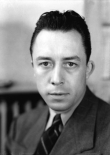In depth
Peace, the only combat: between hell and reason

Albert Camus
Albert Camus, who was a writer above all else, was a very active participant in French public life for four years by means of short articles and reports, which were published in Combat magazine between 1946 and 1950, between his novels The Plague and The Rebel. On 8 August 1945, the day the atomic bomb was dropped on Nagasaki, and two days after the first bomb was used to attack Hiroshima, he wrote the piece that we reproduce here. The piece comes from his book Actuelles. Écrits Politiques, which was first published by Gallimard in 1950, and is one of the contributions published in the chapter "Morals and Politics" (issue XI). We have given it a title based on the two central ideas of the text: the use of science for total destruction places humanity at a terrible crossroads which makes peace the only battle worth fighting, and which must force the peoples of the world to tell their governments that the choice between hell and reason must be made.
(Rafael Grasa)
(Combat, 8 August 1945)
The world is what it is, which is to say, nothing much. This is what everyone learned yesterday, thanks to the formidable concert of opinion coming from radios, newspapers, and information agencies. Indeed we are told, in the midst of hundreds of enthusiastic commentaries, that any average city can be wiped out by a bomb the size of a football. American, English and French newspapers have poured forth a steady stream of elegant dissertation concerning the future, the past, the inventors, the cost, the peaceful uses and the military implications, the political consequences and even the independent character of the atomic bomb. We can summarise it all in a sentence: the civilization of the machine has just reached its ultimate degree of savagery. We will have to choose, in the relatively near future, between collective suicide and the intelligent use of scientific conquests.
In the meantime, one is entitled to think that there is something indecent about celebrating in this way a discovery that has been put to its first use by the most formidable destructive rage that man has known for centuries. In a world that has torn itself apart with every conceivable instrument of violence and shown itself incapable of exerting any control, while remaining indifferent to justice or even mere human happiness, the fact that science has dedicated itself to organised murder will surprise nobody, except perhaps an unrepentant idealist.
These discoveries must be reported and commented on for what they are, and announced to the world so that man has a proper idea if his own destiny. It is intolerable for these terrible revelations to be wrapped in picturesque or humorous essays.
Even before now it was not easy to breathe in this tormented world. Now we find ourselves confronted by a new source of anguish, which has every likelihood of proving fatal. Mankind had undoubtedly been given its last chance, and the newspapers have seized on this as a pretext for a special edition. But surely the subject deserves some reflection and some considerable silence.
There are also other reasons for withholding our applause from the futuristic romance that the newspapers have been laying before us. When one sees the foreign affairs editor of Reuters proclaiming that this invention nullifies or renders obsolete the decisions made at Potsdam, and makes it pointless to worry about whether the Russians are in Konigsberg or in Turkey at the Dardanelles, we must assume that in this fine chorus there lurk intentions that have nothing to do with the objectivity of science.
Let there be no mistake about our meaning. If the Japanese surrender after the destruction of Hiroshima and they face the intimidation of the atomic bomb, we will rejoice. Nevertheless, we shrink from using news as grave as this as a basis for any decision other than to argue still more energetically in favour of a genuine international organisation in which the great powers will have no more rights than medium-sized or small nations, and in which war, a plague that has become terminal by the fruits of the human mind alone, will no longer be decided by the appetites or doctrines of any one State.
Before the terrifying prospects now available to humanity, we see even more clearly that peace is the only goal worth struggling for. This is no longer a prayer but a demand to be made by all peoples to their governments: a demand to choose definitively between hell and reason.